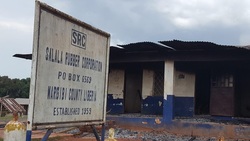
SOCFIN's subsidiary, the Salala Rubber Corporation, rejects dispute resolution with 22 communities in Liberia who filed a complaint with the IFC's Compliance Advisory Ombudsman, citing concerns with the "partiality of CAO’s team".
Report from the World Bank/IFC's Compliance Advisory Ombudsman on the case of Salala Rubber Corporation
The following is an update from the World Bank/IFC's Compliance Advisory Ombudsman (CAO) on the case of a complaint by 22 communities in Liberia against SOCFIN's subsidiary, the Salala Rubber Corporation
Liberia / Salala Rubber Corporation-01/Margibi and Bong
Complainant
Community members from twenty-two communities located in the Margibi and Bong counties in Liberia (Confidential)
Date Filed
Concerns
Land grab and forced eviction, lack of consultation, economic displacement and loss of livelihood, employment conditions and labor rights violations, water pollution, gender-based violence and threats of reprisals and intimidation
Case Status
Open - Compliance
SYNOPSIS
Project Overview
IFC has an active project with Salala Rubber Corporation (SRC) which is Liberia’s fourth largest rubber producing and processing company. IFC provided a $10 million A Loan to SRC, to finance SRC’s plans to rehabilitate, expand, and optimize its plantations, which had been neglected during several years of civil war in Liberia.
Complaint
On May 27, 2019, a complaint was submitted to CAO by four NGOs representing twenty-two communities from the Margibi and Bong counties in Liberia, who have requested their identities be kept confidential. The complaint raises concerns related to land grab and forced eviction, lack of consultation, economic displacement and loss of livelihood, employment conditions and labor rights violations, water pollution, gender-based violence and threats of reprisals and intimidation.
CAO Action
CAO found the complaint eligible for further assessment in June 2019 and conducted a field visit to Liberia in October 2019 to discuss options for addressing the complaint with the relevant parties. During CAO’s assessment, the Complainants indicated their willingness to engage in a dispute resolution process facilitated by CAO, however the Company raised concerns about the CAO process and the partiality of CAO’s team. Given these concerns, the Company indicated a willingness to engage with the impacted community, but not in a CAO led dispute resolution process. In keeping with CAO’s Operational Guidelines, the complaint was referred to CAO’s Compliance function. CAO’s Assessment Report is available in English under “View Documents” below, as well as IFC’s response.
Status
The case has been referred to CAO compliance for appraisal of IFC’s environmental and social performance.
Status as of March 31, 2020
Note: A CAO assessment does not entail a judgment on the merits of complaints. Rather, the aim is to listen to people's concerns, understand the different perspectives, and determine what options are available to address the complaint through CAO's Dispute Resolution and Compliance functions.













